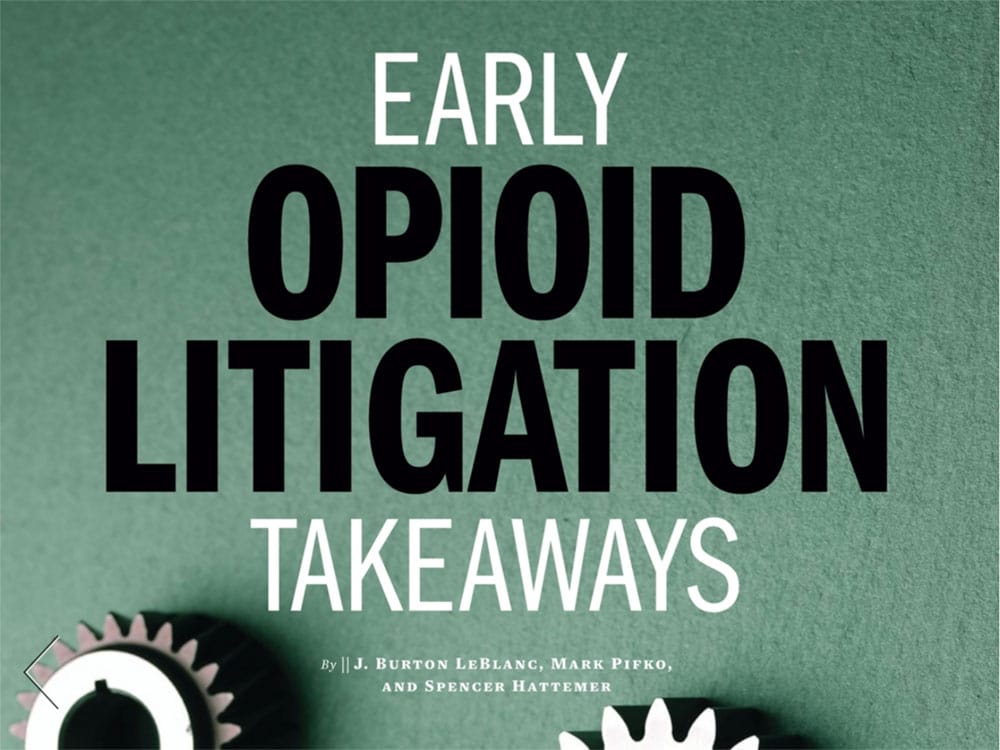Helping Communities File Opioid Lawsuits
The plaintiffs in the opioid multidistrict litigation (MDL) include approximately 2,500 cities, counties, and other entities in federal court. Many states are also pursuing litigation in this matter. The attorneys at Baron & Budd have decades of experience successfully representing government entities including municipalities, counties, and states.

The White House Council of Economic Advisers estimated that the cost of the opioid epidemic exceeded $2.5 trillion dollars just for the four-year period of 2015 to 2018.
We are holding big pharma responsible for:
Failing to report large, inconsistent and suspicious opiate drug orders.
Misrepresenting the benefits and safety associated with long-term opiate use.
Failing to fully evaluate potentially risky opioid prescriptions before dispensing them.
Employing fake third parties to endorse prescription opioid drugs.
Cities, counties, municipalities, and other government entities represented by Baron & Budd are seeking compensation for the role pharmacies and distributors played in the opiate addiction crisis across the country and subsequent healthcare costs states and counties have had to absorb because of it.
Pharmacies Failed to Investigate “Red Flag” Prescriptions Before They Were Filled
Under state and federal law, pharmacies have a “corresponding responsibility,” which means that they must investigate potential concerns regarding opioids before they dispense them to patients. Claims brought against the nation’s largest retail pharmacy chains assert that they filled prescriptions without conducting the requisite due diligence. As a result, an oversupply of opioids flooded into communities across the country.
Distributors Failed to Report Suspicious Opiate Drug Orders
Cases against giant drug distributors like McKesson, Amerisource Bergen, and Cardinal Health claim that they failed to report suspicious prescription opiate orders. Under Federal law, controlled substance distributors have a duty to report suspicious orders made by pharmacies, hospitals, doctors’ offices, and clinics. However, in violation of federal law, the wholesale distributors have a history of not reporting orders that are obviously suspicious because of their size and inconsistency with previous orders.
Human & Capital Cost of the Opioid Epidemic
Early data from the Centers for Disease Control suggests in 2019 there was a 4.8% increase in fatal overdoses from the previous year. The CDC also said that almost 70% of drug overdose deaths in 2018 involved an opioid. The states with the highest drug overdose death rates are West Virginia, Delaware, Maryland, Pennsylvania, Ohio and New Hampshire. The rise in opiate prescription drug use and abuse started in the 1990’s when large pharmaceutical companies employed illegal marketing tactics. Heavily marketed drugs include Oxycontin, Vicodin, and Percocet.
According to the CDC, “from 1999 to 2018, more than 232,000 people died in the United States from overdoses involving to prescription opioids. Overdose deaths involving prescription opioids were more than four times higher in 2018 than in 1999.”
Why are the Distributors Allegedly Negligent?
Liabilities for the defendants are different in each case and jurisdiction. Some were charged with creating a public nuisance. Other charges range from false advertising to violations of federal and state controlled substance laws.
Many plaintiffs are arguing the case that the distributors were responsible for monitoring large or unusual orders. According to 21 Code of Federal Regulations 1301.74(b) a suspicious order that opiate distributors have a duty to report include “orders of unusual size, orders deviating substantially from a normal pattern, and orders of unusual frequency.” 21 C.F.R. § 1301.74(b).
